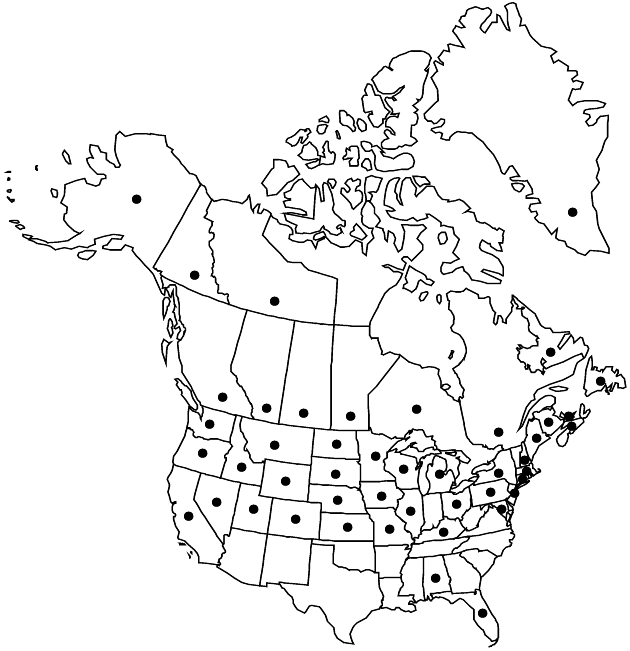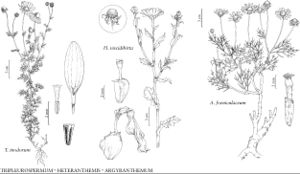Tripleurospermum inodorum
Tanaceteen, 32. 1844.
Annuals (sometimes biennials or perennials), (5–) 30–60 (–80) cm. Stems 1, ascending to erect, usually branched distally, sometimes proximally, glabrous or glabrate (sparsely hairy when young). Leaf-blades 2–8 cm, ultimate lobes filiform, 4–20 mm, not fleshy, apices apiculate. Heads (1–) 10–200+, 3–4.5 cm diam., in corymbiform arrays of solitary heads at ends of branches. Phyllaries centrally dark greenish or brownish, oblong, subequal, scarious margins colorless to light-brown, 0.1–0.2 mm wide. Ray-florets 10–25; corollas (4–) 10–13 (–20) mm. Disc corollas 1–2.5 mm. Cypselae pale-brown, ribs separated by 1/3+ their widths, abaxial-apical resin-glands ± circular, faces minutely roughened between ribs. 2n = 18, 36.
Phenology: Flowering May–Sep.
Habitat: Fields, dry shorelines, waste places
Elevation: 0–1500+ m
Distribution

Introduced; Greenland, Alta., B.C., Man., N.B., Nfld. and Labr., N.W.T., N.S., Ont., P.E.I., Que., Sask., Yukon, Ala., Alaska, Calif., Colo., Conn., Idaho, Ill., Iowa, Kans., Ky., Maine, Md., Mass., Mich., Minn., Mo., Mont., Nebr., Nev., N.H., N.J., N.Y., N.Dak., Ohio, Oreg., Pa., S.Dak., Utah, Wash., Wis., Wyo., also in Europe, Pacific Islands (New Zealand)
Discussion
Tripleurospermum inodorum has been classified as a noxious weed (class C) in the state of Washington and is considered invasive in other states (it is resistant to some herbicides); it is a weed of cereals in western Canada. W. L. Applequist (2002) has shown that the name Matricaria inodora is not a superfluous new name for M. chamomilla as earlier stated by S. Rauschert (1974). Therefore, the appropriate name under Tripleuro-spermum is T. inodorum. She also considered its type to belong in T. maritimum and formally recognized it there as subsp. inodorum, on the basis of hybridization with other T. maritimum subspecies (A. Vaarama 1953); on the same basis, however, Hämet-Ahti maintained the species distinction between T. inodorum and T. maritimum, while making T. phaeocephalum a subspecies of the latter. Q. O. N. Kay (1994), in a more extensive review of the literature and of hybridization data, also maintained T. inodorum and T. maritimum as distinct species, a conclusion followed here. From the standpoint of weed science, taxonomic merging of T. inodorum and T. maritimum has the inconvenience of grouping under a single specific name taxa that have different physiologies, ecologies, weed potentials, and, possibly, reactions to weed control measures.
The name Matricaria inodora var. agrestis Weiss was not validly published.
